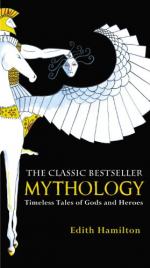|
|
Mythology Part 4: Heroes of the Trojan War, Chapter 1: The Trojan War
The siege of Troy was caused ultimately by the conflict between the goddesses Hera, Athena, and Aphrodite. At the marriage banquet of Peleus and Thetis, the goddess of discord, Eris appeared and threw an apple engraved with the words "to the fairest". She did this because she was upset that she had not been invited. Zeus sent the three goddesses who claimed the apple to be judges by prince Paris of Troy. Each bribed him: Hera with rule over Asia and Europe, Athena with a crushing defeat of the Greeks and Aphrodite with the most beautiful woman in the world. He chose Aphrodite. The fairest woman in the world was Helen, a daughter of Zeus and Leda, sister of Castor and Pollux. All the greatest men of Greece had courted her:
"When her suitors assembled in her home to make a formal proposal for her hand they were so many and from such powerful families that her reputed father, King Tyndareus, her mother's husband, was afraid to select one among them, fearing that the others would unite against him. He therefore exacted first a solemn oath that they would champion the cause of Helen's husband, whoever he might be, if any wrong was done to him through his marriage." Part 4, Chapter 1, pg. 259
The King chose Menelaus, brother of Agamemnon, to wed his daughter and rule over Sparta. Paris came to their home and was welcomed as a guest. While he was in their house, Menelaus had to go to Crete. While he was gone, Paris broke the bond of guest and host by stealing Helen away. Menelaus returned and called all the chieftains together who had sworn the oath. Two important men, Odysseus and Achilles did not show up. Odysseus pretended he was insane so he would not have to go to war. When someone came to get him, he was sowing salt into the soil; the messenger set his infant son before the plow to prove that Odysseus was sane. Odysseus stopped and went to find Achilles. Achilles was hidden among women. Odysseus entered the court as a peddler and knew which was Achilles when one of the women started to play with a sword.
The fleet converged, but the wind was blowing the wrong way. A prophet told Agamemnon that they would only get a different wind if they sacrificed Agamemnon's daughter, Iphigenia. Agamemnon yielded eventually and sent for his daughter under the pretense that she was to be married. They left with a thousand ships and the first man to step ashore was Protesilaus, who died. There were a thousand ships total, but the Trojans and their allies, led by Hector, were very strong. Hector and Achilles were both aware that they would have to die for Troy to fall.
The war did not change significantly for nine years. After so long, the Greeks suffered from a plague because Agamemnon had kidnapped the daughter of a priest of Apollo. When Achilles exposed to the troops that the girl must be given back for the plague to stop, Agamemnon became enraged and demanded Achilles' girl in exchange. Achilles, having lost the girl unfairly, withdrew from battle and asked his mother, Thetis to appeal to Zeus and have the Greeks lose ground to the Trojans. In this way, the Greek chieftains would realize the utter importance of Achilles. Zeus, in a dream, prompted Agamemnon to attack the next day. Menelaus and Paris fought in a duel and Menelaus would have won if Aphrodite had not rescued the young prince. The armies clashed in battle and many men died. The greatest of the Greek champions were Ajax and Diomedes. Diomedes wounded Aphrodite and raged through the ranks in slaughter. He also wounded Ares with help from Athena. With Ares out of the battle, the Trojans began to falter.
Hector returned to the battle after talking to his wife Andromache and his son. His son if frightened by the armor and his wife begged him to order the battle from the walls and not enter into the melee. He entered the fray and the Greeks were repulsed to their ships. That night the Greeks sent an embassy to Achilles asking him to return to battle. He refused. In the next day's battle they began to regain lost ground because Hera had distracted Zeus. When Zeus realized what has happened, he raged back into the battle. Apollo rejuvenated Hector who had been wounded, and they pushed the Greeks back against the ships.
Patroclus donned Achilles' armor in order to lead the Myrmidons and rally the Greeks. Despite a brave charge and gallant fighting, Patroclus was struck down by Hector. Achilles was heartbroken and swore to kill Hector. His mother Thetis begged him, "Only to wait until morning...I will bring you arms fashioned by the divine armorer, the god Hephaestus himself!" Part 4, Chapter 1, pg. 272. Thetis brings him marvelous weapons and he reenters the battle to find many wounded captains. Hector knows that he must face Achilles, but runs away from him three times around the walls. Athena tricks him into making a stand and he is killed. Achilles desecrates his body but eventually gives it up to his father, Priam, the King of Troy. The Trojans mourn him for nine days.




